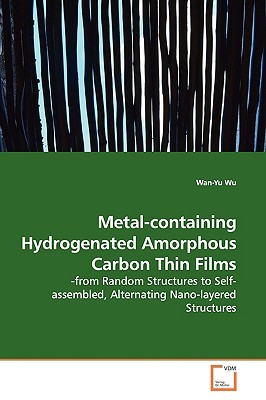
- We will send in 10–14 business days.
- Author: Wan-Yu Wu
- Publisher: VDM Verlag
- ISBN-10: 3639140958
- ISBN-13: 9783639140958
- Format: 15.2 x 22.9 x 1.1 cm, softcover
- Language: English
- SAVE -10% with code: EXTRA
Metal-containing Hydrogenated Amorphous Carbon Thin Films (e-book) (used book) | bookbook.eu
Reviews
Description
The growth and characteristics of metal containing amorphous hydrogenated carbon thin films (a-C: H/Me) were studied in this research. The discovery and the explanation of unprecedented self-assembled, alternating nano-layered structures are addressed. a- C: H/Me thin films were synthesized using one single target, a rotating but not revolving substrate, and constant feed gas compositions in a conventional reactive sputter deposition chamber. In order to explain the formation of the distinct structures, correlations were first made among the deposition rate, the composition, the crystallinity, the surface chemistry, and the microstructure of a- C: H/Me thin films. As a result, a processing window was obtained for the formation of the self- assembled, alternating nano-layered structures. It was found that such structures can be obtained under controlled growth parameters for selected metals. A growth mechanism based on the considerations of clustering of carbon and metal, segregation of carbon, catalytic effects of metal, formation of carbide, energy of adatoms, and surface diffusion of metal and carbon, has been developed.
EXTRA 10 % discount with code: EXTRA
The promotion ends in 16d.09:18:24
The discount code is valid when purchasing from 10 €. Discounts do not stack.
- Author: Wan-Yu Wu
- Publisher: VDM Verlag
- ISBN-10: 3639140958
- ISBN-13: 9783639140958
- Format: 15.2 x 22.9 x 1.1 cm, softcover
- Language: English English
The growth and characteristics of metal containing amorphous hydrogenated carbon thin films (a-C: H/Me) were studied in this research. The discovery and the explanation of unprecedented self-assembled, alternating nano-layered structures are addressed. a- C: H/Me thin films were synthesized using one single target, a rotating but not revolving substrate, and constant feed gas compositions in a conventional reactive sputter deposition chamber. In order to explain the formation of the distinct structures, correlations were first made among the deposition rate, the composition, the crystallinity, the surface chemistry, and the microstructure of a- C: H/Me thin films. As a result, a processing window was obtained for the formation of the self- assembled, alternating nano-layered structures. It was found that such structures can be obtained under controlled growth parameters for selected metals. A growth mechanism based on the considerations of clustering of carbon and metal, segregation of carbon, catalytic effects of metal, formation of carbide, energy of adatoms, and surface diffusion of metal and carbon, has been developed.


Reviews